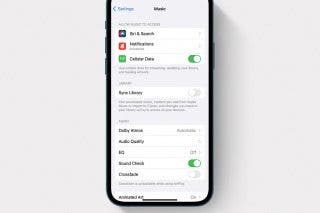Webster Accepts ‘They’ as a Singular Pronoun and We Do Too


 Remember English class in High School when you had to learn when to use ‘they’ and when to use ‘his or her’? For example, “Everybody loves their own mother,” when grammatically correct should read, “Everybody loves his or her own mother.” Personally, I have always thought rules like this make people hate grammar. But the outdated rule also excludes non-binary and outside of binary individuals. To remedy that, the Washington Post and even Merriam Webster accepts ‘they’ as a singular pronoun. We at iPhone Life do too, and we wanted to let you know about the change.
Remember English class in High School when you had to learn when to use ‘they’ and when to use ‘his or her’? For example, “Everybody loves their own mother,” when grammatically correct should read, “Everybody loves his or her own mother.” Personally, I have always thought rules like this make people hate grammar. But the outdated rule also excludes non-binary and outside of binary individuals. To remedy that, the Washington Post and even Merriam Webster accepts ‘they’ as a singular pronoun. We at iPhone Life do too, and we wanted to let you know about the change.
First of all, a quick history lesson to explain how we got to the point where ‘they’ as a singular pronoun isn’t correct. Turns out, this was a pretty late development to the English language. It wasn't until the late 18th century that the singular use of them, they, or their became bad grammar. When the change was accepted in the 19th century, it wasn’t even correct to use ‘his or her’ but just ‘his’. Of course, this blatant sexism completely excluded women and eventually we switched to the more encompassing ‘his or her.’
However, it’s important to continue to understand who you’re including when ‘his or her’ is used. This refers solely to those who identify within a binary gender like male or female. However, the spectrum is vastly wider than this dichotomy, and now we’re coming back around to how it was originally done when Shakespeare’s plays were written.
Everyone deserves to be represented in the media they consume. ‘They’ as a singular pronoun is largely accepted as a replacement for him and her in speech and when referring to someone who doesn’t identify as either male or female. It only makes sense for grammar to recognize this cultural shift by accepting the singular pronoun ‘they’ as well.
So, if you see ‘they’ as a singular pronoun in future iPhone Life posts, we haven’t made a mistake. We’re just catching up to the times. For more information on the “Awkward Case of ‘His or Her,” check out the video below.

Conner Carey
Conner Carey's writing can be found at conpoet.com. She is currently writing a book, creating lots of content, and writing poetry via @conpoet on Instagram. She lives in an RV full-time with her mom, Jan and dog, Jodi as they slow-travel around the country.


 Rachel Needell
Rachel Needell
 Amy Spitzfaden Both
Amy Spitzfaden Both

 Rhett Intriago
Rhett Intriago
 Olena Kagui
Olena Kagui

 Brian Peters
Brian Peters
 Leanne Hays
Leanne Hays


 Devala Rees
Devala Rees



